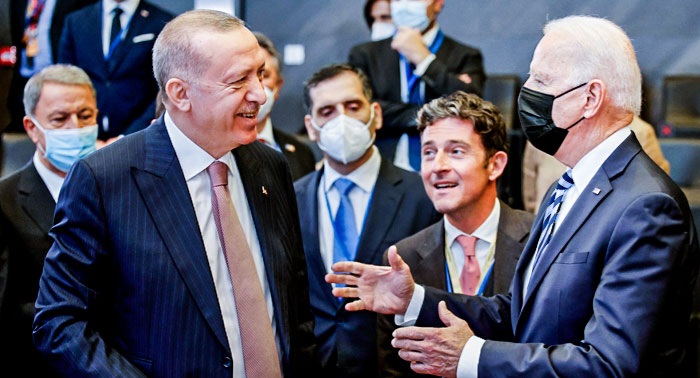Alwaght- Since the start of Ukraine war, Turkey as a NATO member has been in challenge deciding on how to deal with the Western punitive measures against Russia, to the extent that after the war, Ankara's diplomatic chill with the European capitals and Washington intensified and so did the pressures on Turkey.
To show that the West is excessive in its criticism of Turkey and adopts biased view to the conditions of protecting the NATO unity, the government of President Recep Tayyip Erdogan has raised various issues arguing that the Turkish interests are neglected by the West.
To this end, in recent months, Erdogan brought the criticism against the West for its policy about Fethullah Gulen, a US-based Turkish preacher Erdogan accuses of plotting against him, to the top of issues between Turkey and the Western countries.
In an interview on Saturday, the Turkish leader said: “Who is supporting them [the Gulenists]? First of all, Greece does. They flee to Greece, they flee to Europe. They always do. They live in Germany, France, the Netherlands, Britain, and the America. America hides this man. Who is hiding him? Biden is hiding him. They gave him in Pennsylvania a mansion.”
The Turkish government accuses the Gulen movement of masterminding the July 15, 2016 coup and labels it a "terrorist organization," although the movement strongly denies involvement in the coup or any terrorist activity.
For years, Turkey has been officially demanding the extradition of Gulen, the spiritual leader of the Gulen movement, to Turkey, but the White House has turned down Ankara's requests each time.
However, the start of Ukraine war and the Western struggle to build as much broad alliance as possible granted Erdogan government an opportunity to put strains on NATO to review what it calls its counter-terrorism policies.
When Sweden and Finland bid for NATO accession, Erdogan tied acceptance of their membership in the military bloc to removing his concerns related to the activities of Kurdistan Workers Party (PKK) in European countries and the Western support to the Syrian Kurds whom he calls PKK affiliates. All-member acceptance is required before bidders can initiate the process of NATO membership, and if even a single member is opposed, the process cannot go ahead.
Now, it is obvious that Turkey is trying to wrest from the West concessions regarding restriction of activities of Gulen movement's leaders and members.
This comes as there are only less than 8 months left to the crucial presidential election in Turkey, which many observers and analysts believe will be a referendum on Erdogan's political fate.
Although polls have so far given the lead to Erdogan and his ruling Justice and Development Party (AKP) over the opposition, what is certain is that Erdogan's political hegemony is not as firm as before as Turkey is hit by economic troubles, on top of them the unprecedented 80 percent inflation.
Also, it should not be forgotten that Erdogan's opponents are uniting their ranks to take him out of power at any expense. The dangers of this alliance for Erdogan become more apparent when one considers the fact that even at the height of his popularity, he won only slightly more than half of the votes, and the gap in the ranks of his rivals has been one of the factors of his stay in power. For example, in the 2014 and 2018 presidential elections, he respectively won 51.8 and 52.6 percent of the votes.
Recently, the Turkish police launched a campaign of detention targeting the in-service and former military officers and also former cadets and state employees. Arrest warrants of 60 of the 77 arrested people in Istanbul, Ankara, and Izmir contain affiliation with the Gulen movement as a reason for detention.
In Ankara, 14 of the 15 people arrested are civil servants and officers who were dismissed after July 15, 2016.
After the failed coup, the Turkish government declared a state of emergency and carried out a massive purge in government institutions under the pretext of fighting the coup plotters. More than 130,000 state employees, including 4,156 judges and prosecutors, as well as 29,444 members of the armed forces, were dismissed from their jobs on charges of membership in or association with "terrorist organizations.”
The recently detained people are accused of helping convicts whose verdicts are finalized by court of appeals to flee the country.
One of these people who fled is Bulnet Kenes, whose name was mentioned by Erdogan. Kenes was editor of Zaman newspaper that was seized by the government after the coup attempt. He is one of the tens of people Ankara wants him back in return for green light for Sweden’s NATO membership.
Kenes told the AFP that he was dining with his wife at home and watching Erdogan's news conference when he heard his name mentioned by the president.
He said that his name was mentioned when the journalists asked Erdogan about the “terrorists’ Turkey wants them back from Sweden.
Kenes has been living in Sweden since 2017 with political asylum.
Kenes works for Stockholm Center for Freedman, an advocacy organization founded by a group of Erdogan dissidents. Ankara has gradually increased the number of people it wants them be extradited; first 33, then 45, and now 73, reports by media close to government citing unofficial lists suggest.
Certainly, Erdogan is concerned about the Gulenists’ activities in the months ahead of the elections and blacklisting the movement as a terrorist one gives the government the opportunity to put pressure on the opposition and Western countries that look forward to see his defeat and rise of a government aligned to the West concerning Russia and Ukraine war.



























